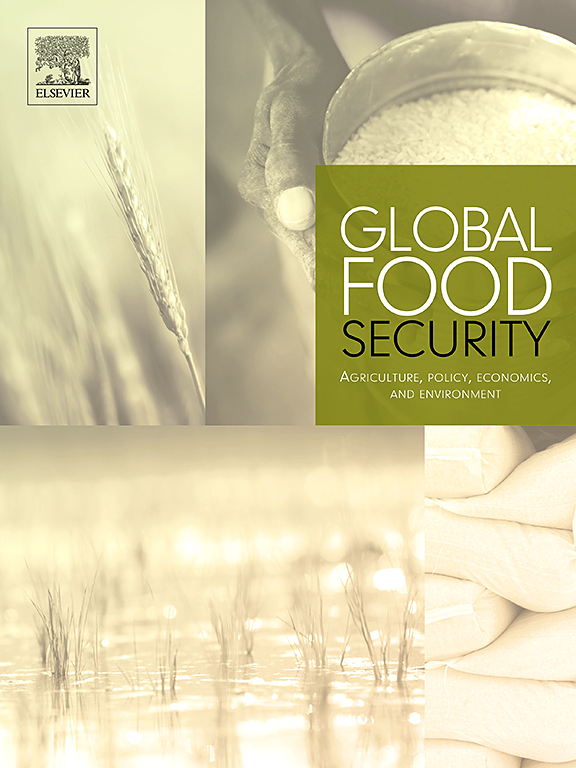New insights into the measurement of household well-being for vulnerable economies: Evidence from Pakistan's labor and diet data
IF 9.6
1区 经济学
Q1 FOOD SCIENCE & TECHNOLOGY
Global Food Security-Agriculture Policy Economics and Environment
Pub Date : 2025-07-31
DOI:10.1016/j.gfs.2025.100876
引用次数: 0
Abstract
Well-being is a multidimensional concept. Global measures of well-being like the Human Development Index (HDI) and the Multidimensional Poverty Index (MPI) use indicators such as education, health, and living standards. Nevertheless, both HDI and MPI do not include essential factors of human well-being, especially in lower- and middle-income economies, i.e., decent work and food insecurity. Lack of decent work and food insecurity are two key factors that majorly contribute to the deprivation of household well-being. The lack of decent work conditions substantially contributes to various issues, including low wages, long working hours, and unsafe work environments. These factors can have a detrimental impact on the physical and mental health of workers. Similarly, food insecurity correlates with malnutrition, leading to poor health outcomes and a diminished quality of life. Addressing decent work and food security is essential for improving community well-being and health. In this paper, we construct a novel index that is decomposable to incorporate these dimensions of well-being, i.e., labor and diet. Employing Alkire and Foster (2008) methodology, we develop a multi-dimensional well-being index (MWBI) using PSLM/HIES (2018–19) data for different occupational groups in Pakistan. Our findings indicate that 26 % of households experience poor well-being in Pakistan, with rural areas facing double the deprivation relative to urban areas. KPK province ranks the most deprived, while Punjab is the least deprived. Female-headed households are more deprived (34 %) than male-headed households (26 %). Those in low-skill, agricultural, or entertainment sectors perform the worst. In contrast, those in high-skill, non-agriculture, real estate, and clerical support roles show the least deprivation. Our policy recommendations are improving skills through technical and vocational training programs, supporting legislation to enforce the minimum wage for informal workers, and enhancing labor protections and job opportunities for women. Focusing on the interplay of labor and diet is pivotal for promoting well-being in vulnerable economies.
对脆弱经济体家庭福利衡量的新见解:来自巴基斯坦劳工和饮食数据的证据
幸福是一个多维的概念。人类发展指数(HDI)和多维贫困指数(MPI)等全球福祉衡量指标使用教育、健康和生活水平等指标。然而,人类发展指数和MPI都不包括人类福祉的基本因素,特别是在低收入和中等收入经济体,即体面工作和粮食不安全。缺乏体面的工作和粮食不安全是导致家庭福利被剥夺的两个主要因素。缺乏体面的工作条件在很大程度上造成了各种问题,包括低工资、长工作时间和不安全的工作环境。这些因素可能对工人的身心健康产生不利影响。同样,粮食不安全与营养不良有关,导致健康状况不佳和生活质量下降。解决体面工作和粮食安全问题对于改善社区福祉和健康至关重要。在本文中,我们构建了一个新的可分解指数,以纳入这些维度的福祉,即劳动和饮食。采用Alkire和Foster(2008)的方法,我们使用PSLM/HIES(2018-19)数据为巴基斯坦不同职业群体开发了多维幸福指数(MWBI)。我们的研究结果表明,巴基斯坦26%的家庭生活状况不佳,农村地区的贫困程度是城市地区的两倍。KPK省是最贫困的,而旁遮普省是最不贫困的。女性户主家庭(34%)比男性户主家庭(26%)更贫困。从事低技能、农业或娱乐行业的人表现最差。相比之下,从事高技能、非农业、房地产和文职支持工作的人的贫困程度最低。我们的政策建议是通过技术和职业培训项目提高技能,支持立法执行非正规工人的最低工资,加强劳动保护和妇女的就业机会。关注劳动和饮食的相互作用对于促进脆弱经济体的福祉至关重要。
本文章由计算机程序翻译,如有差异,请以英文原文为准。
求助全文
约1分钟内获得全文
求助全文
来源期刊

Global Food Security-Agriculture Policy Economics and Environment
FOOD SCIENCE & TECHNOLOGY-
CiteScore
20.90
自引率
3.40%
发文量
69
期刊介绍:
Global Food Security plays a vital role in addressing food security challenges from local to global levels. To secure food systems, it emphasizes multifaceted actions considering technological, biophysical, institutional, economic, social, and political factors. The goal is to foster food systems that meet nutritional needs, preserve the environment, support livelihoods, tackle climate change, and diminish inequalities. This journal serves as a platform for researchers, policymakers, and practitioners to access and engage with recent, diverse research and perspectives on achieving sustainable food security globally. It aspires to be an internationally recognized resource presenting cutting-edge insights in an accessible manner to a broad audience.
 求助内容:
求助内容: 应助结果提醒方式:
应助结果提醒方式:


